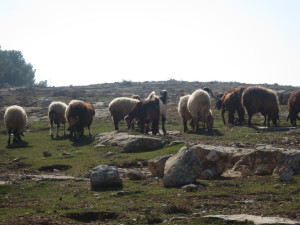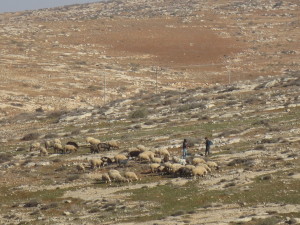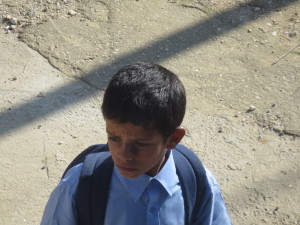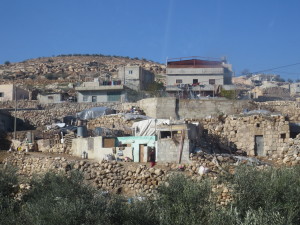At-Tuwani, where resisting is existing
marzo 6, 2014 in Palestina, Traduzioni da Anna Zorzi
Written by Sonia Trovato, translated by Anna Zorzi ![]()
Stop grumbling! Going to school is a privilege! This is what your dear granny used to tell you again and again while you would have given anything just to play hooky and stay at home, comfortably sitting on your living room’s sofa, stuffing yourself with chips and watching cartoons, instead of studying the multiplication tables or the Italian verbs by heart. In the small village of At-Tawani, in the C zone of the West Bank, which according to the Oslo agreements is under the military and administrative control of Israel, you are face to face with the true meaning of those words. For all those kids living in the few houses perched on the side of the hills south of Hebron portrayed in the documentary Tomorrow’s land , going to school is not only a privilege, but also a real odyssey every day. The small village lies near the settlement of Ma’on and the illegal outpost (illegal because neither the international law nor the Israeli law recognized it) of Havat Ma’on, where fierce, fanatical settlers live.
To prevent pupils from being harassed on their way to school, the representatives of Operazione Colomba, an Italian non-violent association with one of its headquarters in At-Tawani, escorted them for some days.  After the violent attack to one of these volunteers, who got away with a punctured lung, the Israeli administration took the decision to assign its army units the task to guarantee young Palestinians the right to education. You try to imagine what it means to these innocent creatures to have to rely on the protection of the same people who violate their home privacy by breaking into their houses at night for illegal searching, insulting their relatives or, worse, announcing the future demolition of their homes.
After the violent attack to one of these volunteers, who got away with a punctured lung, the Israeli administration took the decision to assign its army units the task to guarantee young Palestinians the right to education. You try to imagine what it means to these innocent creatures to have to rely on the protection of the same people who violate their home privacy by breaking into their houses at night for illegal searching, insulting their relatives or, worse, announcing the future demolition of their homes.
This small piece of land, with its olive trees and pastures that make it look like an old picture of Southern Italy before the building boom, offers you, at first glance, an eerie silence. But soon after a few minutes you can hear a strange, incessant buzz in the air: it’s the military aircraft flying over the area. The occupation has changed not only the geography of original Palestine, but also your auditory perception by replacing the bleating of sheep with the demonstrations of the power of the Israeli arsenal.
But At-Tuwani endures it, because Palestinians think that resisting is existing – says Hafez Huraini, the representative of the popular Resistance committee.  By appealing to the Israeli law, this non-violent movement has been able to counteract the ultimate destruction of the small village and to stop the building of a 41-km long wall, which was one of the many walls the Israeli administration puts up to get rid of the Other and to add acres of land to its spoils of war. While you feel sorry to hear another tale of injustice and usurpation, two volunteers who should have shown you the work done by Operazione Colomba have to leave you since a farmer is calling for their help. Every day here are episodes of beatings, poisoning of livestock, burning olive trees and provocations by the settlers and farmers hope that international visits can act as a deterrent.
By appealing to the Israeli law, this non-violent movement has been able to counteract the ultimate destruction of the small village and to stop the building of a 41-km long wall, which was one of the many walls the Israeli administration puts up to get rid of the Other and to add acres of land to its spoils of war. While you feel sorry to hear another tale of injustice and usurpation, two volunteers who should have shown you the work done by Operazione Colomba have to leave you since a farmer is calling for their help. Every day here are episodes of beatings, poisoning of livestock, burning olive trees and provocations by the settlers and farmers hope that international visits can act as a deterrent.
Lots of women in At-Tuwani are involved in the resistance, which works mainly through the Handicraft Cooperative. Women have to deal with two different kinds of struggle: on one side is the external enemy, which is Israel, on the other side are the traditions and our men. It was hard for them to accept that women could work and contribute to the cause, but now it’s a great achievement- proudly says Keifah Adarah, the coordinator of the women’s cooperative. Her sixteen-year-old son Sami Huraini begins to speak and describes you his emotions and feelings during the journey to Rome he made the year before through the intermediation of Assopace Palestina. Sami was fascinated at least fifty times by the eternal beauty of your capital city and he was amazed at your freedom of movement, which allows you to move around without the obligation to suffer the humiliating process of document control.  Sami, in his solar and vaguely Irish look, has a radiant smile and the enthusiasm of his young age, but at the same time he is mature enough to realize that he can’t enjoy the distractions he would have the right to.
Sami, in his solar and vaguely Irish look, has a radiant smile and the enthusiasm of his young age, but at the same time he is mature enough to realize that he can’t enjoy the distractions he would have the right to.
On your way to the coach, a kid – a very sad one, with obvious abrasions on his face – follows you and sits on one of the empty seats. You look at him in great despair while he is getting off, he looks back at you with his dejected eyes , and this makes you feel worse. Why does that child look so miserable ? asks one of you naively. Should he be happy to live in Palestine, to live in At-Tuwani? Replies the wise. That look, which seems to contain the sufferings of all the people of an entire country, is only an anticipation of the hell you will find in Hebron.






